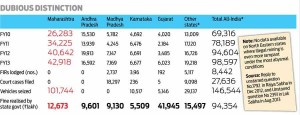Maharashtra loves illegal mining
Though cases have swelled in the recent past, the fine collected from offenders is on a downhill road.
On August 23, 2013, a reply tabled by Union minister of mines before the Lok Sabha confirmed Maharashtra’s position as the national leader in respect of illegal mining (see table). In fact, Maharashtra has continued to lead the pack for four years in a row. It could be for a longer period of time, but data available with dna cover only the last four years.
 Curiously, however, the data presented to the Lok Sabha and the Rajya Sabha also indicate that the state did not file any first information reports (FIRs) – a mandatory requirement when there is a case of wrong-doing. Would this indicate that the state does not consider illegal mining to be a crime?
Curiously, however, the data presented to the Lok Sabha and the Rajya Sabha also indicate that the state did not file any first information reports (FIRs) – a mandatory requirement when there is a case of wrong-doing. Would this indicate that the state does not consider illegal mining to be a crime?
Another curious finding is that the state impounded the maximum number of vehicles in the country. Were these vehicles retained by the government? If yes, would it not make sense to auction them off and fill the state exchequer?
Or were the vehicles released as a conciliatory move a little time after they were seized? One does not know, because the data provided to the legislative bodies has little to offer by way of clarification.
Equally interesting is the amount of fine collected from parties indulging in illegal mining. Unfortunately, current laws introduced by the Centre allow for a fine of just a laughable Rs25,000 for each incident of illegal mining – ridiculous, considering the amount of profit is made from this line of activity.
But what is worrisome is the decline in fines collected.
During 2011-12, against 40,642 incidents of illegal mining, Maharashtra collected Rs131.43 crore by way of fines. But during the following year (2012-13), even though incidents of illegal mining recorded went up to 42,918, fine collection actually dipped to Rs126.72 crore. Was the state being magnanimous? Or were pressures of election funding responsible for both the spurt in illegal mining and the dip in fine levied and collected?
In fact, Gujarat comes out better, though this state too saw a spurt in illegal mining from 3,485 incidents to 6,023 during the same period. But, unlike Maharashtra, it saw the fine collected swell from Rs69.6 crore to Rs419.4 crore. Clearly, there was harsher punitive action taken in Gujarat than in Maharashtra. Moreover, in Gujarat there were 192 FIRs lodged and 5 cases filed. The number of vehicles seized, though, stood at 5146, significantly lower than the numbers seized in Maharashtra.
Overall, however, as Dinsha Patel, Union minister of mines, admitted, “Incidents of illegal mining have increased during last three years.” That admission also makes one wonder if the national outcry against mining in Karnataka and Goa and against companies associated with Jagan Reddy of Andhra Pradesh was politically motivated rather than an attempt to cleanse the system.
That is a terrible discovery because when the application of law becomes selective, justice becomes a weapon of oppression, not a vehicle to promote principles and ethics.





































COMMENTS